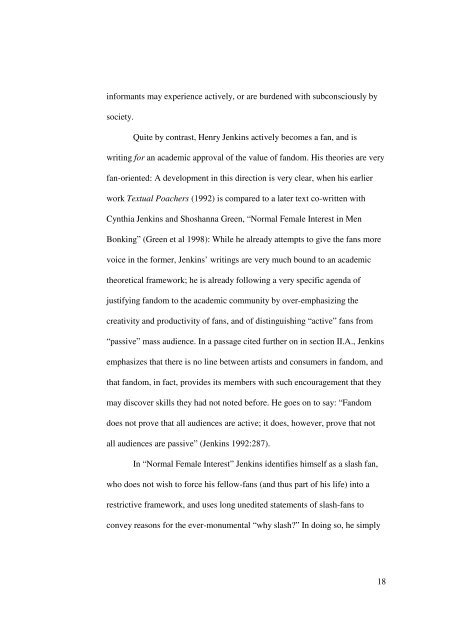Girls who like Boys who like Boys – Ethnography of ... - Yuuyami.com
Girls who like Boys who like Boys – Ethnography of ... - Yuuyami.com
Girls who like Boys who like Boys – Ethnography of ... - Yuuyami.com
Create successful ePaper yourself
Turn your PDF publications into a flip-book with our unique Google optimized e-Paper software.
informants may experience actively, or are burdened with subconsciously by<br />
society.<br />
Quite by contrast, Henry Jenkins actively be<strong>com</strong>es a fan, and is<br />
writing for an academic approval <strong>of</strong> the value <strong>of</strong> fandom. His theories are very<br />
fan-oriented: A development in this direction is very clear, when his earlier<br />
work Textual Poachers (1992) is <strong>com</strong>pared to a later text co-written with<br />
Cynthia Jenkins and Shoshanna Green, “Normal Female Interest in Men<br />
Bonking” (Green et al 1998): While he already attempts to give the fans more<br />
voice in the former, Jenkins’ writings are very much bound to an academic<br />
theoretical framework; he is already following a very specific agenda <strong>of</strong><br />
justifying fandom to the academic <strong>com</strong>munity by over-emphasizing the<br />
creativity and productivity <strong>of</strong> fans, and <strong>of</strong> distinguishing “active” fans from<br />
“passive” mass audience. In a passage cited further on in section II.A., Jenkins<br />
emphasizes that there is no line between artists and consumers in fandom, and<br />
that fandom, in fact, provides its members with such encouragement that they<br />
may discover skills they had not noted before. He goes on to say: “Fandom<br />
does not prove that all audiences are active; it does, however, prove that not<br />
all audiences are passive” (Jenkins 1992:287).<br />
In “Normal Female Interest” Jenkins identifies himself as a slash fan,<br />
<strong>who</strong> does not wish to force his fellow-fans (and thus part <strong>of</strong> his life) into a<br />
restrictive framework, and uses long unedited statements <strong>of</strong> slash-fans to<br />
convey reasons for the ever-monumental “why slash?” In doing so, he simply<br />
18


